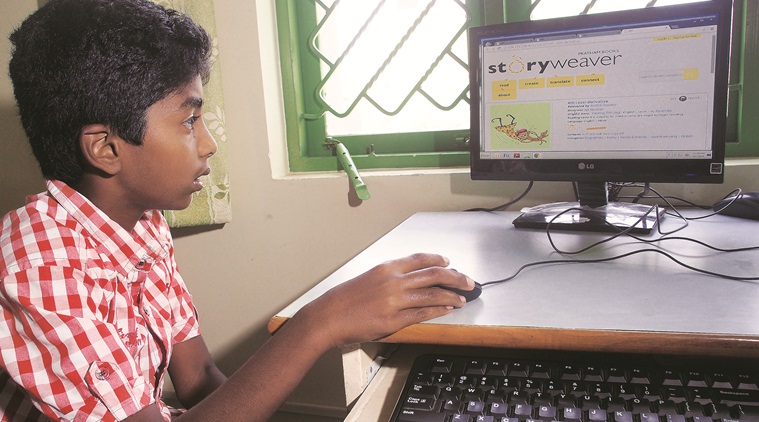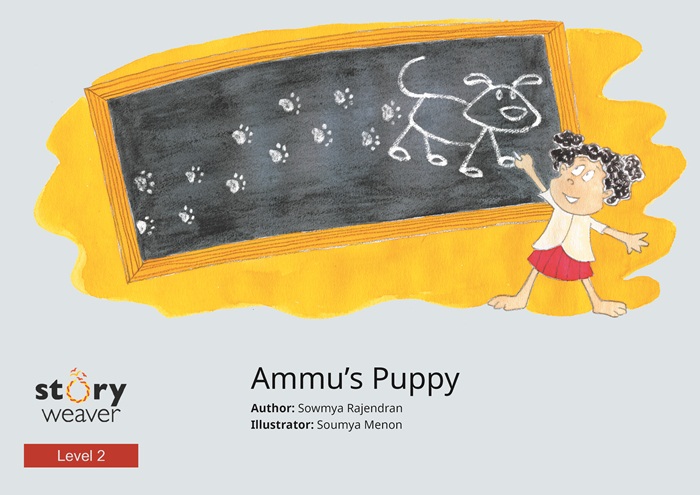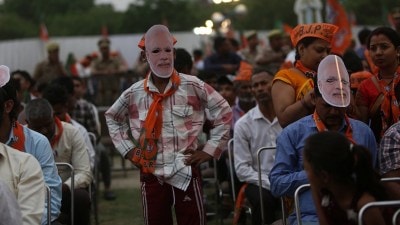- India
- International
A book in every hand: Pratham Books wants to make reading fun and accessible for children
On International Literacy Day earlier this month, Bangalore-based NGO Pratham released more than 800 books alongside their translations in 27 languages on their new website Storyweaver.com, inviting children from across the world to read stories in the languages they speak and study.
 A child browses through Pratham’s StoryWeaver website
A child browses through Pratham’s StoryWeaver website
A school boy explains to his teacher that the reason he could not complete his homework was because of a mischievous cat. First, it got stuck in a tree, prompting him to come to its rescue. Then, a monkey entered his kitchen and ate the family’s food. Afterwards, when his father brought home chicken curry and rotis for the family, a dog wandered in and ate the boy’s notebook. This fun story, titled It’s All the Cat’s Fault by popular children’s author Anushka Ravishankar, is an illustrated book that has garnered more than 2,000 views on StoryWeaver’s website, a week after it was launched by Pratham Books to reach out to children who cannot afford to buy books.
On International Literacy Day earlier this month, Bangalore-based NGO Pratham released more than 800 books alongside their translations in 27 languages on their new website Storyweaver.com, inviting children from across the world to read stories in the languages they speak and study. Spread across various categories, including fiction, history, maths, fantasy, plays and science, these stories can be read, downloaded, translated and printed using the tools on the platform; new stories can also be created using illustrations from the 2,000-strong image bank and published online. This collaborative platform hopes to bring together authors, translators, illustrators and educators and was developed in an year’s time for “the child without access”.
So far, it has registered 20,000 views in less than a week’s time. Purvi Shah, head of Digital Projects, says, “Pratham has been looking at pricing good quality translations at Rs 35 to pricing story cards at Rs 4. Yet, we realised that there is a large gap with our mission and we wanted to create a platform where everyone could contribute. Through the open licensing of content, we could scale up what we could not do as a team. With only 35 unique titles that we work on in a year, it adds up to nothing because if children were to read a book every day, we would still need 300 books. Add to that the bridge of languages, because nobody is doing works in Konkani and Sanskrit.”
 Stories are spread across categories and levels
Stories are spread across categories and levels
To mark the launch of their digital platform, Pratham Books had initiated its “Weave-a-Story” campaign, where leading children’s authors such as Ravishankar, Soumya Rajendran and Rohini Nilekani wrote special stories for it and illustrators Priya Kuriyan and Soumya Menon brought many stories to life with the help of their illustrations. Among its collection of 834 storybooks is Annual Haircut Day by Nilekani, the story of Sringeri Srinivas, who has very long hair and wants it cut on annual haircut day. But to his surprise, everyone is busy on that day, right from the barber to his wife and the illustration ends with a hilarious take on who finally ends up helping the troubled man. There is also Rajendran’s Mouse in the House, an action-packed adventure for little ones, when a mouse enters a house and creates chaos.
Pratham’s mission is fairly simple: to reach out to rural and urban poor children with these stories in digital formats so that reading becomes a democratic exercise and hyperlocal content is generated aplenty. But how will the venture benefit those with no access to the internet? Shah says, “A lot of non-profit organisations have digital libraries, with computers and internet access. They can also download these books and read them later through our offline download features. Among the many examples who will benefit from this initiative are teachers from the NGO 17,000 Feet, who works towards educating children in rural Ladakh. They can now translate stories into Ladakhi language. Those working towards the revival of Sanskrit language can now translate works to encourage its use as a conversational language.”
Apr 25: Latest News
- 01
- 02
- 03
- 04
- 05



































